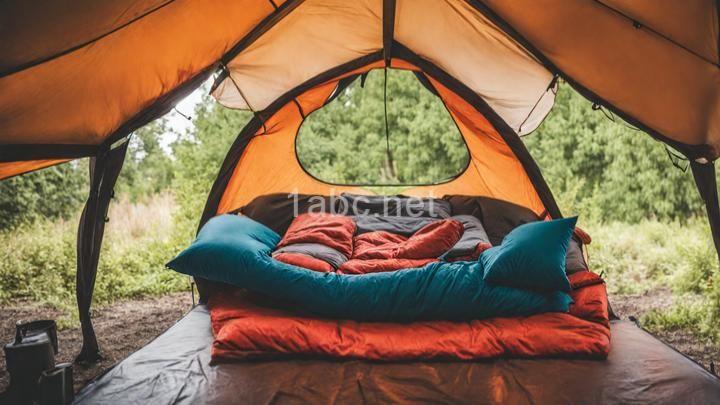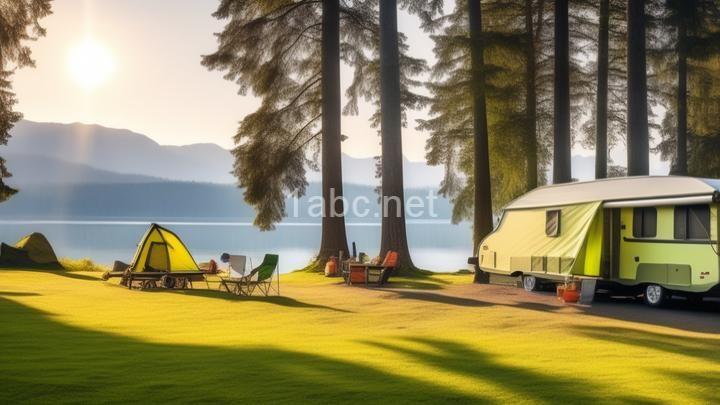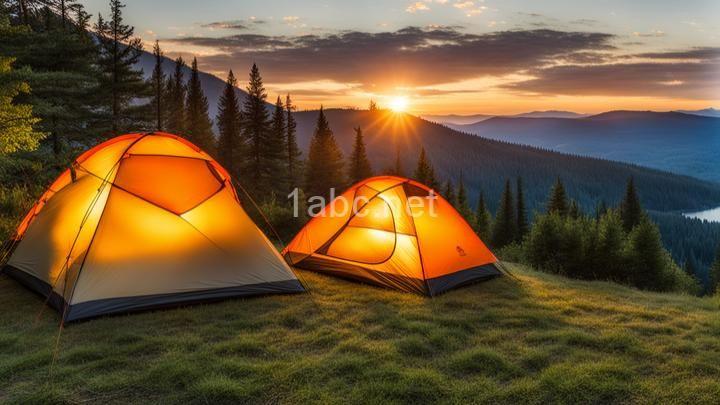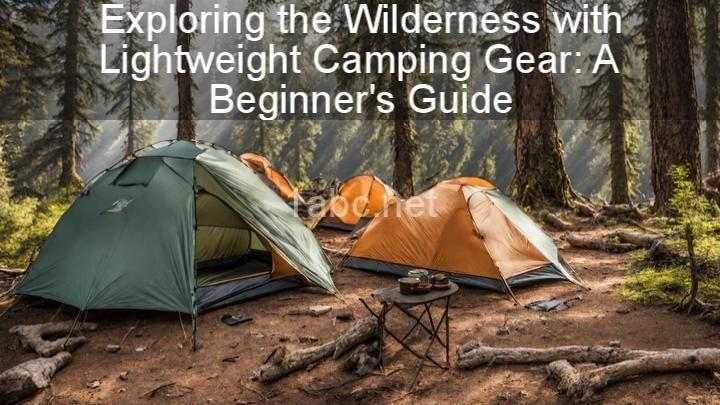Campsite Comfort: Why Choosing the Right Tent Size is Essential
Introduction:
I. Assessing Your Needs:
1. Number of Campers:
2. Sleeping Arrangements:
3. Extra Space for Gear or Activities:
II. Choosing the Right Capacity:
III. Dimensions and Floor Space Considerations:
IV. Headroom and Livability:
V. Weight and Portability Factors:
VI. Weather Considerations:
VII. Tips for Tent Setup and Organization:
1. Utilize Storage Pockets:
2. Use Dividers or Room Separators:
Conclusion:

Introduction:
Hello there, fellow outdoor enthusiasts! Are you ready to embark on your next camping adventure? Before you hit the trails and set up camp, there's one crucial decision you need to make – choosing the right tent size. Trust me, it's not just about squeezing into a tiny space or having a cavernous tent that feels empty. The right tent size can make or break your camping experience, and in this blog post, we'll explore why. So, grab a cup of coffee, sit back, and let's dive into the world of campsite comfort!
I. Assessing Your Needs:
When it comes to choosing the right tent size, it's essential to assess your needs accurately. Consider the following factors before making a decision:
1. Number of Campers:
The number of people joining you on your camping trip is the most crucial factor in determining tent size. If you're camping alone, a smaller tent will suffice. However, if you're traveling with family or friends, you'll need a tent that can comfortably accommodate everyone.
2. Sleeping Arrangements:
Next, think about how you prefer to sleep. Are you comfortable sharing sleeping space, or do you prefer individual sleeping areas? This consideration will impact the size and layout of the tent you choose.
3. Extra Space for Gear or Activities:
Lastly, consider whether you'll need extra space for gear storage or if you plan to engage in activities inside the tent, such as playing cards or reading. Having the right amount of extra space will enhance your overall camping experience.
II. Choosing the Right Capacity:
Now that you've assessed your needs, let's talk about tent capacity. Tent capacity is typically labeled with numbers like 2-person, 4-person, and so on. However, it's important to note that these numbers are not always an accurate representation of comfort.
When selecting a tent, it's advisable to opt for a slightly larger capacity than the number of campers. For instance, if you're a group of four, consider a 6-person tent. This will ensure ample space for your gear, activities, and comfortable sleeping arrangements. Trust me, you'll thank yourself later for the extra space!
III. Dimensions and Floor Space Considerations:
As you explore different tent options, pay attention to the dimensions and floor space. Tent dimensions play a significant role in determining comfort. A tent with generous dimensions will allow you to move around freely without feeling cramped.
To ensure comfortable sleeping arrangements, consider the floor space required for individual sleeping pads or air mattresses. If you like a bit more room to stretch out, opt for a tent with slightly larger dimensions.
IV. Headroom and Livability:
Headroom is another crucial factor in determining comfort within a tent. Imagine having to stoop or crawl every time you want to move around. Not a pleasant thought, right? That's why it's important to choose a tent with adequate headroom, allowing you to stand up and move around comfortably.
Additionally, consider features that enhance livability, such as vestibules or screened-in areas. Vestibules provide extra space for storing gear, while screened-in areas allow you to enjoy the outdoors while keeping bugs at bay. These features can greatly enhance your overall camping experience.
V. Weight and Portability Factors:
When it comes to camping, portability is key. Carrying a heavy tent can quickly become a burden, especially if you have to hike to your campsite. Choosing the appropriate-sized tent can significantly impact the weight you have to carry.
Consider opting for tents made with lightweight materials or those that offer compact designs. This will make transportation a breeze and allow you to enjoy your camping adventure without feeling weighed down.
VI. Weather Considerations:
Mother Nature can be unpredictable, and camping during inclement weather can dampen your spirits if you're not adequately prepared. Choosing an adequately sized tent can make a significant difference in your comfort during adverse weather conditions.
A larger tent with good ventilation options will allow for better airflow, preventing condensation build-up and stuffiness. This will help you stay comfortable and dry, even when the weather takes a turn for the worse.
VII. Tips for Tent Setup and Organization:
Now that you've chosen the perfect-sized tent, it's time to set it up and make the most of the space. Here are a few practical tips for maximizing space utilization and organization:
1. Utilize Storage Pockets:
Most tents come equipped with storage pockets. Use them to keep small items within reach and off the floor, helping to declutter the living space.
2. Use Dividers or Room Separators:
If your tent offers dividers or room separators, take advantage of them. They can create separate sleeping areas or provide privacy when needed.
Conclusion:
Choosing the right-sized tent is essential for a comfortable camping experience. By assessing your needs, considering tent capacity, dimensions, headroom, weight, and weather considerations, you can make an informed decision that will enhance your outdoor adventures.
Remember, a tent is your home away from home when you're out camping. So, take the time to choose wisely, and you'll be rewarded with countless nights of cozy and comfortable camping. Happy camping, fellow adventurers!
FREQUENTLY ASKED QUESTIONS
What is Campsite Comfort?
Campsite comfort refers to the level of comfort and convenience provided at a campsite. It encompasses various amenities and facilities that aim to enhance the camping experience and make it more enjoyable and convenient for campers. These amenities may include clean and well-maintained restrooms, showers, picnic tables, fire pits, and even electricity hookups. The level of campsite comfort can vary depending on the type of campsite, ranging from basic wilderness camping with minimal amenities to more developed campgrounds with a higher level of comfort and convenience.
Why is choosing the right tent size important?
Choosing the right tent size is important for several reasons:
- Comfort: A tent that is too small will not provide enough space for you and your gear, leading to cramped and uncomfortable conditions. On the other hand, a tent that is too big may be difficult to heat or cool effectively.
- Weather Protection: A properly sized tent will offer better protection against the elements. If a tent is too large, it may not provide adequate wind resistance, and in heavy rain, excess space can lead to water pooling inside the tent.
- Gear Storage: A tent with the right size will have enough space to store your gear securely. Having a designated area for storing equipment can help keep the interior organized and prevent damage to your belongings.
- Ease of Setup: A tent that matches your needs in terms of size will be easier to set up and take down. If a tent is too big or small, it may be more challenging to assemble or pack away, causing unnecessary frustration and wasted time.
By selecting the appropriate tent size, you can ensure a more comfortable and enjoyable camping experience.
How do I determine the right tent size for my needs?
To determine the right tent size for your needs, consider the following factors:
- Number of people: Determine how many people will be using the tent. This will help you estimate the amount of space required per person.
- Sleeping arrangements: Decide whether you prefer separate sleeping areas or a communal space. Consider if you'll be using sleeping bags or camping cots.
- Gear storage: Think about the gear you'll be bringing, such as backpacks, camping equipment, and clothing. Make sure you have enough space to store them inside the tent.
- Interior space: Consider if you want extra space inside the tent for changing clothes, playing games, or other activities during bad weather.
- Season and weather conditions: If you'll be camping in colder weather or heavy rains, you may want a larger tent to accommodate additional gear or provide space for indoor activities.
- Tent layout and shape: Take note of the floor dimensions and the tent's shape. Dome-shaped tents tend to provide more headroom, while cabin-style tents offer more vertical walls and overall spaciousness.
As a general rule, always go for a tent that is designed to accommodate one to two more people than you actually need. This will give you extra comfort and space. Additionally, check the tent's floor plan or specifications provided by the manufacturer to get a sense of the tent's livable area and ensure it meets your requirements.
What are the different tent sizes available?
There are various tent sizes available to suit different needs. The most common tent sizes include:
- 1-person tents: These are small and lightweight tents designed for solo campers or backpackers.
- 2-person tents: These tents can accommodate two people, making them ideal for couples or friends.
- 3-person tents: Slightly larger than 2-person tents, these are suitable for small families or a group of friends.
- 4-person tents: These tents provide more space and are great for families or a group of friends.
- 6-person tents: These larger tents offer ample space for bigger groups or families with extra gear.
- 8-person tents: These spacious tents are suitable for large families or groups that require plenty of room.
- 10-person tents: These are the largest tents available, providing enough space for large groups or extended families.
It's important to consider the number of people you'll be camping with as well as the gear you'll be bringing when choosing the size of your tent.




